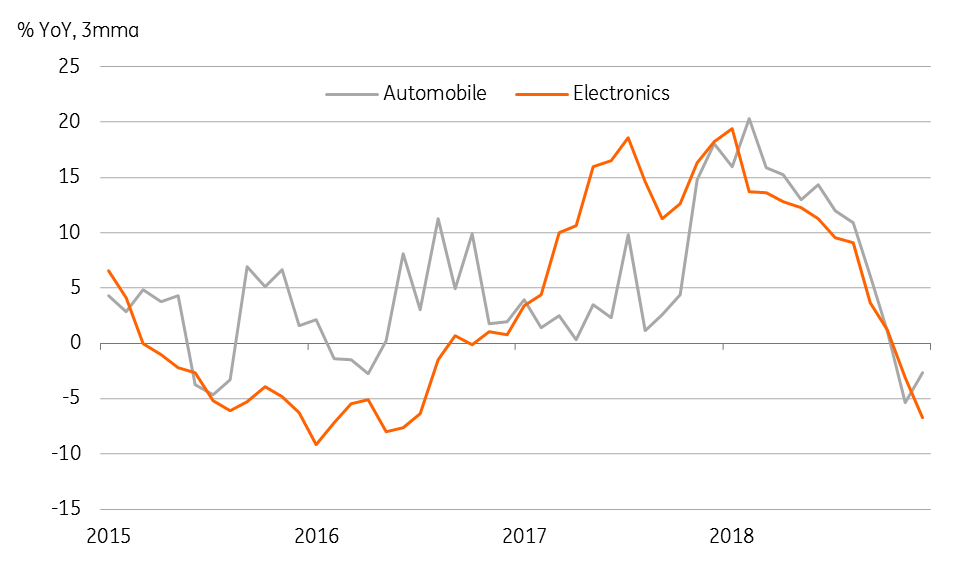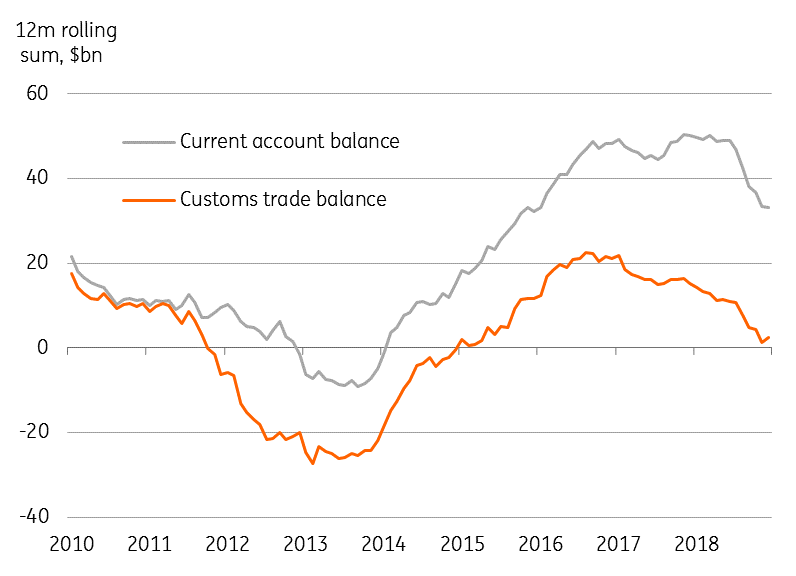Thailand: Trade balance returns to surplus in December
A large current account surplus sustains the Thai baht’s outperformance among Asian currencies coming into 2019. However, underlying our view of the USD/THB weakening above 33 within the next 3-6 months are intensified political risks surrounding the timing of general elections
| $1.1bn |
Trade surplus in December |
| Higher than expected | |
Disappointing imports boost trade surplus
Thailand’s external trade balance posted a surplus of $1.1bn after two consecutive months of deficits. This was at odds with the consensus estimate of a $1bn deficit. A sharp slowdown in imports was responsible for the positive swing in the trade balance. Contrary to the consensus estimate of a slowdown in the year-on-year growth to 4.9% from 14.7% in November, imports crashed by 8.2%.
Falling crude oil prices may explain some of the import weakness, though we believe it's more than that. Electronics and automobile, the front-line sectors to face the brunt of the US-China trade war, are already coming under pressure. Thailand forms a key part of the supply chains for these sectors and the weakening of raw material imports processed for export as electronics and auto parts appears to have gained momentum.
Exports continued to be weak with the 1.7% YoY contraction beating the consensus estimate of a 0.2% fall. Electronics were down 13.5% YoY, the steepest fall in three months, while autos recovered to 2.8% growth from a falling streak since September.
Electronics and automobile exports on a steady downtrend

Narrower current surplus, but it’s still large
The annual export growth of 6.5% in 2018 was a slowdown from 10% growth in 2017. Likewise, import growth eased modestly to 12.7% from 14% over the same period. This produced an annual trade surplus of ‘only’ $2.4bn, a significant drop from over $15bn in 2017.
The trade balance drives the current account. As most of the decline in the trade surplus passed over to the current account, the latter experienced a sharp reduction in surplus over the last year even as services income remained steady. The $29bn current surplus in the first 11 months of 2018 was $17bn lower than in the same period of 2017. We estimate the full-year 2018 current surplus of $33bn or equivalent to 7.7% of GDP. Despite a sharp narrowing from over 11% of GDP in 2016 and 2017, the current surplus is still relatively high among Asian peers, and this represents strong support for the currency.
After a dismal second half of 2018 performance, the THB is back to being among Asia’s top performers thus far in 2019 with a 2.4% appreciation against the USD. If there is anything that could displace it from this position, it’s politics, as uncertainty about the election timing is growing. We maintain our view of the USD/THB weakening to 33 within the next 3-6 months.
Trade balance drives current account balance

Download
Download article
22 January 2019
Good MornING Asia - 22 January 2019 This bundle contains {bundle_entries}{/bundle_entries} articles"THINK Outside" is a collection of specially commissioned content from third-party sources, such as economic think-tanks and academic institutions, that ING deems reliable and from non-research departments within ING. ING Bank N.V. ("ING") uses these sources to expand the range of opinions you can find on the THINK website. Some of these sources are not the property of or managed by ING, and therefore ING cannot always guarantee the correctness, completeness, actuality and quality of such sources, nor the availability at any given time of the data and information provided, and ING cannot accept any liability in this respect, insofar as this is permissible pursuant to the applicable laws and regulations.
This publication does not necessarily reflect the ING house view. This publication has been prepared solely for information purposes without regard to any particular user's investment objectives, financial situation, or means. The information in the publication is not an investment recommendation and it is not investment, legal or tax advice or an offer or solicitation to purchase or sell any financial instrument. Reasonable care has been taken to ensure that this publication is not untrue or misleading when published, but ING does not represent that it is accurate or complete. ING does not accept any liability for any direct, indirect or consequential loss arising from any use of this publication. Unless otherwise stated, any views, forecasts, or estimates are solely those of the author(s), as of the date of the publication and are subject to change without notice.
The distribution of this publication may be restricted by law or regulation in different jurisdictions and persons into whose possession this publication comes should inform themselves about, and observe, such restrictions.
Copyright and database rights protection exists in this report and it may not be reproduced, distributed or published by any person for any purpose without the prior express consent of ING. All rights are reserved.
ING Bank N.V. is authorised by the Dutch Central Bank and supervised by the European Central Bank (ECB), the Dutch Central Bank (DNB) and the Dutch Authority for the Financial Markets (AFM). ING Bank N.V. is incorporated in the Netherlands (Trade Register no. 33031431 Amsterdam).